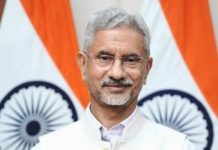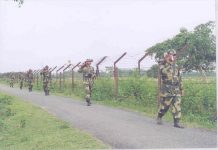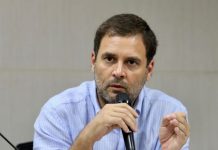India’s Muslims, goes the conventional wisdom, are a votebank. That bank is now working aggressively towards becoming the central bank of Indian politics with a view to dominating its future political currency. If conversations, events and initiatives of the past four weeks are an indicator, Muslim social and political organisations as well as prominent Muslims have evolved a one-point agenda: to deny the Bharatiya Janata Party (BJP) strongman Narendra Modi a shot at becoming India’s prime minister after the 16th General Election that is due in a year. Their tactic: defeat the BJP and its potential allies in every Lok Sabha constituency where the Muslim vote can sway the result.
“Narendra Modi is the No. 1 enemy of India’s Muslims,” says Salman Hussain, a fiery Islamic scholar who teaches at one of India’s most influential Islamic seminaries, the 19th-century Darul Uloom Nadwatul, at Lucknow in Uttar Pradesh. “If Modi becomes prime minister, more Muslims will be massacred, more mosques demolished.” While that may be rabble-rousing at its worst, there is no denying that the anti-Modi sentiment among India’s nearly 180 million Muslims has deepened since a cry went up in the BJP last month to name Modi the party’s top prospect for the Lok Sabha election.
“The BJP is fundamentally an anti- Muslim party and Modi proved that with his role in the massacre of Muslims in Gujarat,” says Arshad Madani, who leads a faction of the Jamiat Ulema-e-Hind, an influential sociopolitical organisation of clerics. Five months after Modi became chief minister, more than 2,000 Muslims died in February-March 2002 in violence by Hindu zealots of the BJP-RSS after a train fire killed 57 Hindu passengers. “Muslims know that if the BJP comes to power, their troubles will worsen.”
Indeed, the chant of Modi-as-PM that shot up in decibels at an all-India meet of the BJP in New Delhi in early March set the cat among the pigeons. Until then, the Muslim electorate across India was widely disenchanted with Prime Minister Manmohan Singh’s United Progressive Alliance (UPA) for unkept promises in its nine-year-rule. They were miffed as the UPA has failed to introduce reservations for them in jobs and educational institutions, a pre-election promise. They were also angered by the sudden hanging in February of Afzal Guru, a Kashmiri who had been on death row for years after being convicted as a conspirator in the 2001 Parliament attack.
Muslim leaders have long slammed the Congress for what they see as its failure to improve the Muslims’ lot after a panel led by former Delhi High Court Chief Justice Rajinder Sachar reported in 2006 that Muslims were one of India’s most neglected social groups in terms of education, employment, poverty and health.
Disappointment has also been rife among the Muslims at the refusal of the Congress-led UPA to declare the Aligarh Muslim University (AMU), the premier Muslim educational institution set up in the 19th century, a minority institution as the Muslims have long demanded. “AMU had hoped Congress President Sonia Gandhi would make the announcement in her telephonic address at the university’s last convocation,” says political commentator Hafiz Nomani. “But she referred to such a major issue only in passing.”
But with Modi’s name to the fore, the foremost concern among Muslims now is to stop the BJP from returning to power in New Delhi at any cost.
The clamour for Modi has also upended efforts within the BJP to draw in Muslim support, chiefly through a Muslim-only ‘morcha’ under the aegis of its parent, the Rashtriya Swayamsevak Sangh (RSS), as well as by Modi’s efforts in recent months to mollycoddle Muslim clerics as well as ordinary Muslims in his state to dust up his image. The demand for Modi so worried BJP stalwart LK Advani, who was the party’s prime ministerial candidate in 2009, that he had to caution his party at the March meeting that it will have to find ways to attract Muslim voters if it truly wants to regain power at the Centre.
“It is true that some Muslims have supported the BJP in recent years,” admits Qasim Rasool Ilyas, a functionary with the All India Muslim Personal Law Board, a 40-year-old community outfit that oversees the implementation of the civil laws. “By putting Modi forward, the BJP runs the risk of losing even that little support.”
 From Lucknow in the north to Hyderabad in the south and Kolkata in the east, the dominant discourse among the Muslim community is as follows: coalition governments that have run India unbroken since 1996 will continue as the norm. Over the past 14 years, the BJP and the Congress party have led two coalition governments each. Whichever of the two parties wins more seats at the next General Election would team up with the floaters to notch a majority and form the government.
From Lucknow in the north to Hyderabad in the south and Kolkata in the east, the dominant discourse among the Muslim community is as follows: coalition governments that have run India unbroken since 1996 will continue as the norm. Over the past 14 years, the BJP and the Congress party have led two coalition governments each. Whichever of the two parties wins more seats at the next General Election would team up with the floaters to notch a majority and form the government.
Except for those political parties that are direct opponents of the Congress in their regions and would, therefore, never join hands with it, or the Communists who would never pair up with the Hindu sectarian BJP, all other regional parties are capable of going either way. Hence, Muslims should vote against the BJP, its allies and the fence-sitters who fail to unequivocally clarify before the elections that they would have no truck with the BJP.
“Wherever a party’s relationship with the BJP is suspect, it would lose the Muslim vote,” says psephologist Yogendra Yadav, who has joined the recently launched anti-corruption Aam Aadmi Party. Says Ilyas: “The Muslim is no more attached to any one party. He now votes tactically to defeat the BJP and this is how it will be in 2014.”
The Jamaat-e-Islami Hind, a social and cultural outfit of which Ilyas has been a member for decades, is currently preparing an extensive advisory to guide Muslim voters across most of the Lok Sabha’s 543 constituencies. It will be released before the next elections to help Muslim voters decide the best way to utilise their vote in defeating the BJP and its allies. Jamaat volunteers and its affiliate outfits, such as its student, women and youth wings, would be pressed into disseminating the message among Muslims so that “secular” candidates may enter the Lok Sabha.
Several other organisations, such as the All India Muslim Majlis-e-Mushawarat, a body of Muslim intellectuals, too, plan to release similar guides on supporting “secular” candidates. “We aim to educate the Muslim voters on the best candidate in their constituency who is secular,” says Mushawarat chief Zafarul Islam Khan.
Elsewhere, efforts have been launched by scholar Salman Hussain of Lucknow along with Lok Sabha MP Badruddin Ajmal from Assam, whose fledgling political party, the All India United Democratic Front, has made rapid strides in that state. The two have now called a meeting in Delhi where they aim to assemble disparate elements from smaller Muslim political outfits to chart out a common strategy, much like Hussain had tried in the 2012 Assembly polls in Uttar Pradesh, to little success.
Muslim leaders reckon the community’s vote can make and unmake pretenders to 100-150 Lok Sabha seats. These seats are not to be confused with those that Muslims win. Today, there are only 30 Muslims in the Lok Sabha, just 5.5 percent of its 543 seats. As per the 2011 Census, Muslims are nearly 15 percent of India’s 1.2 billion people. But although Muslims in the Lok Sabha are barely a third of their share in the population, their arc of electoral influence is far greater. In 35 seats, they number around one in three voters or more. In 38 other seats, Muslims are 21-30 percent of the electorate. If the 145 seats where they are 11-20 percent are added to this, Muslim voters have the ability to influence the outcome in a whopping 218 seats.

Ironically, until now, the Muslim vote has been most effective where it is around 10 percent of the electorate, big enough to sway the result in a multi-cornered contest by going all in for a single candidate, but too small to raise alarm in the BJP or its allies to trigger attempts at a counter-polarisation of non-Muslim votes. On the other hand, wherever their numbers are 20 percent and above, Muslim votes have mostly been ineffective because of a multiplicity of Muslim candidates divvying up their support, often handing victory to the BJP on a platter.
“The challenge before the Muslim community is to make sure it votes as a block for a single candidate even if multiple Muslim candidates are in the fray on a given seat,” says Yashwant Deshmukh, who has run opinion polls in national and state elections across India for two decades.
Muslims have shortlisted Uttar Pradesh, Bihar and West Bengal as their key battleground states because their results would most impact who leads the next government: the Congress or the BJP. Next in importance for the Muslims are Andhra Pradesh, Assam, Maharashtra and Karnataka, where the more seats in the kitty of the Congress the less likely would be the BJP’s chances to form the government. Indeed, the selection of the primary battleground states of Uttar Pradesh and Bihar is based on their experience of coalition politics since 1998, when the BJP formed its first stable national government heading a multi-party coalition with Atal Bihari Vajpayee as prime minister. The key to the BJP’s victories in the 1998 and 1999 Lok Sabha elections lay in its wins in Uttar Pradesh and Bihar. These back-to-back victories jolted the Muslims, who are around 20 percent in these states’ overall population.
Chastened, the Muslims voted tactically in Uttar Pradesh and Bihar in the 2004 Lok Sabha election, giving the BJP fewer seats and bringing the UPA to power. Although the BJP did better in 2009 in Bihar due to its alliance with Janata Dal (United), which virtually wiped out Lalu Prasad Yadav’s Rashtriya Janata Dal, it still fared poorly in Uttar Pradesh, thanks to the voting by Muslims there that gave the UPA a second term.
Indeed, the Muslim vote has dictated the last two poll cycles in Uttar Pradesh. In the 2007 Assembly polls, Muslims massed behind the Bahujan Samaj Party (BSP), giving it a clear majority, ending 15 years of unstable coalition politics. In 2012, Muslims deserted the BSP leader, Chief Minister Mayawati, turning to the Samajwadi Party (SP) and providing it with a majority. “Eight out of 10 Muslims voted for the SP,” says Rajya Sabha MP Mohammad Adeeb from Uttar Pradesh, an independent who campaigned with SP chief Mulayam Singh Yadav last year, but now accuses him of turning his back on the Muslims. “They won because of the Muslims.”
That no political party can take the Muslim vote in Uttar Pradesh for granted is clear from their divergent patterns of voting for the Lok Sabha and the Assembly polls. Despite backing a clear-cut winner in the 2007 Assembly election, the Muslim voters showed another hand in the 2009 Lok Sabha election, dividing their allegiance roughly equally among the SP, the Congress and the BSP, depending on who was strongest to beat the BJP, which then crashed to the bottom of the heap.
Until Modi’s name suddenly leapfrogged to the headlines in March as a prime ministerial contender, political watchers were generally of the view that the failures of the UPA at the Centre and of the one-year-old SP in Uttar Pradesh would benefit the BSP at the 2014 Lok Sabha polls.

Muslims leaders say Uttar Pradesh Chief Minister Akhilesh Yadav, the eldest son of Mulayam, has failed their community, which comprises a whopping 40 million of the state’s nearly 200 million people. Dozens of incidents of sectarian violence have caused a loss of Muslim life and property across Uttar Pradesh. While the SP promised to free Muslim youths arrested earlier for their alleged roles in terror plots, no such action has yet been taken. The state government has also stonewalled calls to disclose the contents of an independent inquiry it commissioned into the disputed arrests of the youths.
“This government (of Akhilesh Yadav) is refusing to govern,” says Maulana Zulfikar, a cleric connected with India’s most influential Islamic seminary of Darul Uloom at Deoband near Muzaffarnagar city in west Uttar Pradesh. Muslims are also angry with Akhilesh as he has failed to nominate heads for statutory organisations that cater to the Muslims, such as the Minorities Commission, the Urdu Academy and the Sunni Central Waqf Board, which administers the massive properties deemed to be jointly owned by the Sunni Muslims in the state. This might drive them to the Congress party, especially if Modi is a prime ministerial candidate, says Zulfikar.
Abdul Bari, a veteran of the Jamaat-e-Islami, is candid: “Muslims are dominant in over 36 Lok Sabha constituencies in east and west Uttar Pradesh. They will explore alternatives to the SP.”
And yet, there is grudging acceptance that with Modi as a frontrunner, Muslims can’t move away from either the Congress or the SP. “It’s no longer a secret that Modi is the BJP’s PM candidate,” says Abdul Khalik, a retired bureaucrat in Lucknow. “Muslims may be unhappy with the Congress but they have no other option to vote for.” Indeed, both the Congress and the SP now believe they are in the play for Muslim votes once again, as BSP’s Mayawati has a history of tying up with the BJP.
In just two weeks in March, four public meetings focussing exclusively on the Muslims were called at Lucknow, three of them bringing out tens of thousands of Muslims on the streets. While one meeting, on 2 March, was directly called by Mulayam, he also occupied centrestage at another rally that Arshad Madani of Jamiat Ulema- e-Hind called on 17 March.
On the same day, the Congress party’s Muslim face, External Affairs Minister Salman Khurshid, who hails from Uttar Pradesh and once headed the party’s state unit, descended on Lucknow at a town hall sort of meeting with Muslims, exhorting them to break free from the SP’s grip. Earlier, on 3 March, MP Adeeb led a huge rally of Muslims jointly with the Communists to demand that Muslims arrested in terror cases be released. “Muslims in Uttar Pradesh have the capacity to make and unmake national governments,” he says. At that rally, the Muslims hooted Ashok Vajpayee, the SP candidate from Lucknow for the 2014 polls, and refused to let him speak.

Of the 80 Lok Sabha constituencies in Uttar Pradesh, Muslims number over 20 percent of the electorate in two dozen seats in west Uttar Pradesh, including Bareilly, Badaun, Pilibhit, Rampur, Sambhal, Amroha, Meerut, Muzaffarnagar, Saharanpur, Bijnor, Amroha and Moradabad. In east Uttar Pradesh, Muslims play a decisive role in at least eight seats — Azamgarh, Bahraich, Gonda, Srawasti, Varanasi, Domariyaganj, Gonda and Balrampur.
The various Muslim outfits are now in a dialogue with each other to ensure that the experience of Azamgarh in 2009 is not repeated. At that time, a chunk of the Muslim votes, which are nearly 13 percent for that seat, was eaten away by a fledgling Muslim outfit named Ulema Council, leading to a win by the BJP. Now an influential section of the Muslims is making efforts to rally support for the SP. Says Salman Khan, a leader of the Azamgarh traders’ association: “If the BJP projects Modi as PM, it would lead to a sectarian polarisation.” Two other candidates that the Ulema Council fielded in 2009 ate away Muslim votes in Lalganj and Jaunpur.
That a fight between the Congress and the SP may actually benefit the BJP is worrying Muslims a lot in a constituency named Domariyaganj that borders Nepal. It is currently held by Congress’ Jagdambika Pal. The SP has named Assembly Speaker Mata Prasad Pandey to take him on. Troubled Muslim religious leaders have held several meetings to decide whom to support. “Modi is the most talked about issue here among the Muslims,” says local businessman Malik Mohammed Shabbir. “He has to be stopped.”
In Bahraich in central Uttar Pradesh, where Muslims are over 30 percent of the electorate, they are weighing other options as the incumbent MP, Kamal Kishore of the Congress, who was once a commando detailed to protect former prime minister Rajiv Gandhi, is considered to have frittered his political capital.
In Bareilly in west Uttar Pradesh, where Muslims are 34 percent, a new Muslim political outfit floated by the brother of the most influential Muslim in the region, the caretaker of a centuries’ old Sufi mausoleum, is causing trepidation among those who don’t want to see BJP strongman Santosh Gangwar recapture a constituency he lost in 2009 after five straight wins since 1991. The toss-up for the Muslims here is between the Congress and the SP, which has given the ticket to a greenhorn named Ayesha Begum, the daughter-in-law of Taukeer Raja Khan, the man behind the new Muslim political outfit.
In states other than Uttar Pradesh where the Muslim voters may be willing to go against the Congress, Modi is haemorrhaging support from the allies of the BJP. Bihar CM Nitish Kumar has crafted a political miracle by fetching up Muslim votes even for the BJP because it was aligned with him in two Assembly elections. In the 2009 Lok Sabha election, his JD(U) won 20 of the state’s 40 seats and the BJP 12. But his aversion to Modi’s name is now legion. Says Yogendra Yadav: “For three years, Nitish has been telling the Muslims of his state that ‘when you vote for me, you vote for me’.” Adds MP Adeeb: “Nitish knows that if he backs Modi, the Muslim voters in Bihar will quickly move en masse to Lalu.”
Indeed, Yogendra Yadav believes that West Bengal CM Mamata Banerjee, too, would need to clarify her position on the possibility of backing the BJP in forming the next government at the Centre to her state’s 27 percent Muslim population. “She will have to do something before the Lok Sabha election, which would make her position clear vis-à-vis Modi,” he says. The Muslim voters’ disenchantment with the 34-year Communist rule contributed in no small measure to bringing Banerjee to power in the state in 2011.
For the same reason, Odisha CM Naveen Patnaik, once a BJP partner, and former Andhra Pradesh CM Chandrababu Naidu, who was a kingmaker in the BJP-led coalition government of 1999 but has been in political wilderness since losing power in the state in 2004, are keeping miles away from the BJP.
“Although the BJP has no presence in Andhra Pradesh, no party here can dare to openly align with it now that Modi’s name has come up,” says Zahid Ali Khan of Hyderabad, a veteran activist and editor of a leading Urdu daily newspaper, Siyasat.
That, in effect, is true of virtually all political parties in the country wherever the Muslim votes count. The sprawling residence of India’s prime minister at New Delhi’s upscale 7, Race Course Road, may well turn out so near and yet so far for Narendra Modi.
With inputs from Virendra Nath Bhatt in Lucknow, Imran Khan in Bengaluru and Ratnadip Choudhury in Guwahati
ajit@tehelka.com













